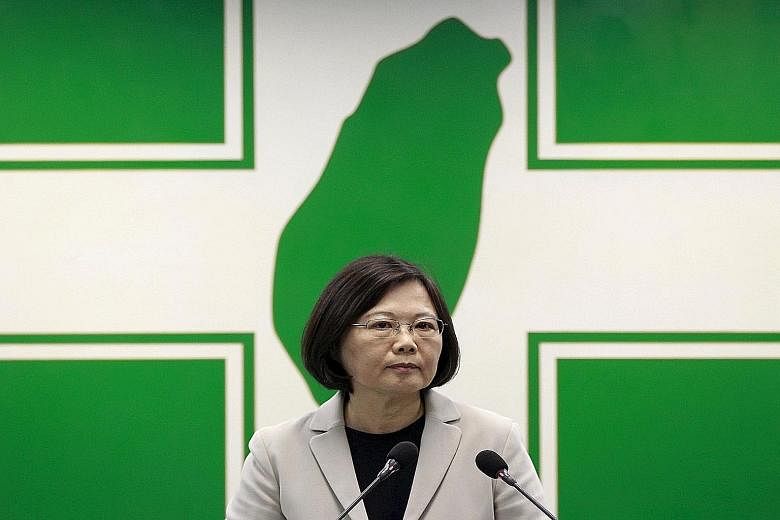BEIJING • Plans by Chinese state- backed Tsinghua Unigroup to invest US$2.6 billion (S$3.7 billion) in Taiwan should not be politicised, China's government has said, after the front runner in the island's January presidential polls said they posed a "huge threat".
Longstanding political tension between the neighbours has seen Taiwan restrict Chinese investments in its prized semiconductor sector, with an eye to protecting intellectual property and trade secrets.
Tuesday's comments by Dr Tsai Ing-wen, leader of the independence-leaning Democratic Progressive Party, viewed with suspicion by China, flag potential regulatory obstacles for the technology conglomerate's ambition to take control of three Taiwan chip firms.
Asked about opposition to the deal yesterday, Mr Ma Xiaoguang, spokesman for China's Taiwan Affairs Office, said it was a purely commercial issue. "It should not be politicised," he told a regular news briefing.
Economic and business links between the two sides are beneficial for both, with Taiwan having gained the most, as can be seen from its large trade surplus with China, he added.
"The trend of economic cooperation and development across the Taiwan Strait can't be stopped and can't be diverted because of the will of a single person," Mr Ma said.
He added that China will ease restrictions for Taiwanese to do business on the mainland, by opening 24 sectors, including advertising and packaging, to entrepreneurs from Taiwan from Jan 1 next year.
China considers democratic Taiwan to be a renegade province to be brought under Beijing's control, by force, if necessary.
Dr Tsai had warned of the threat of allowing Unigroup into Taiwan as that will give the company "power in gaining key control of the upstream and downstream industry".
Unigroup plans to take a stake of about 25 per cent in each of three chip test and packaging firms: ChipMOS Technologies, Siliconware Precision Industries and Powertech Technology. The deals have yet to win shareholder and regulatory approvals in Taiwan, however.
China was also upset this week over news that the United States is expected to authorise the sale of two guided missile frigates to Taiwan, despite its opposition to the deal.
The sale would mark the first time in four years that the US has shipped arms to Taiwan, the longest such gap in nearly four decades. Past US weapons sales to Taiwan have attracted strong condemnation in China.
Mr Ma said China was "resolute" in its opposition to any form of weapons sale by any country to Taiwan.
All parties should recognise that the basic guarantee of peace and stability across the Taiwan Strait is to oppose Taiwan independence, he added.
REUTERS, XINHUA

